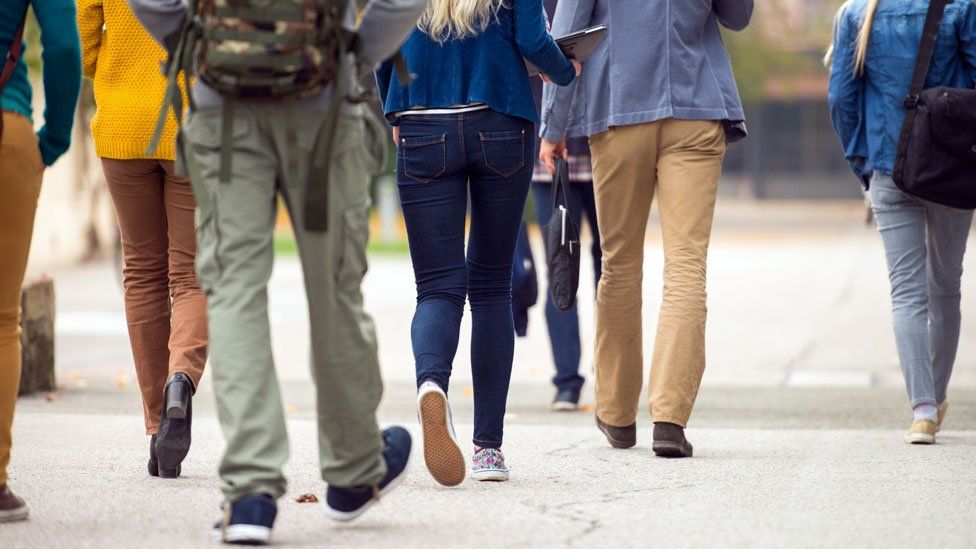Students go online to report alleged sexual abuse
- Published

University students are posting allegations of sexual abuse online, as they do not feel their universities are listening, a National Union of Students (NUS) official has said.
NUS women's officer Sarah Lasoye said sexual assault was the "biggest issue facing female students at university".
During the past month, there have been more than 15,000 retweets of claims from students at seven UK universities.
Universities UK said: "Every case of sexual violence is one too many."
The group, together with the Office for Students, has been tasked by the government with tackling sexual abuse at universities.
Both organisations say they are making progress but more needs to be done.
The Next Episode, a new podcast available on BBC Sounds, has spoken to alleged victims of sexual assault, some of whom have posted about their experiences on Twitter.
Some details have been changed to protect the identity of the women.
'Posting online empowered me'
Stephanie, 20, said: "I knew him from back home but we went to different universities.
"One night he tried to kiss me - he was drunk and he wouldn't take no for an answer.
"Then, later that night, he raped me. I went to the police and my university straight away but I didn't get support until I developed medical problems because of the stress that night caused.
"[Posting online] made me feel empowered - seeing others talking about it online gave me back my voice."
'You're just a number to universities'
Amelia, 21, said: "He was a close friend and I trusted him before all of this.
"He stayed over at my house and I said he could sleep in my bedroom as long as he kept on his side of the bed.
"When I woke up, my top had been taken off and he was touching my breasts. I told him, 'No.'
"Unis love to say they care for students. But they're a business. You are a number to them. You are £9,000 a year. I don't believe they provide support. They didn't care for me."
'Lack of support'
Sasha, 21, said: "He was a very close friend. One day, at a party, we ended up alone in a bedroom.
"He started kissing me. But then I stopped and said I wanted to go downstairs. He was persistent - he wouldn't let me go downstairs and he kept trying to sweet-talk me. I pleaded for him to leave.
"I spoke to my university but that made it even worse. The actual assault was traumatic, obviously, but the lack of support from the authorities just added to the stress. I tweeted about my experience because I wanted to let women know they need to be careful."
'Turning to social media'
Speaking before this week's NUS women's conference in Bristol, which started on Wednesday, Ms Lasoye said that universities around the country were currently not doing enough to support students like Amelia, Sasha and Stephanie.
She added: "Students are turning to social media because they don't see a place where their experiences will be listened to, validated or dealt with effectively."
In 2016, a report by a Universities UK taskforce made a series of recommendations to help tackle sexual abuse.
Responding to Ms Lasoye's comments, a Universities UK representative said: "All students and staff are entitled to a safe and positive experience and all universities have a duty of care to provide that outcome.
"This includes ensuring we create an environment where students feel able to come forward with the confidence that an incident will be addressed."
Nicola Dandridge, chief executive of the Office for Students, said: "Tackling the issue will require action and collaboration from a range of parties.
"The Office for Students has invested £2.4m in projects based in universities and colleges across England, to devise better ways of tackling sexual assault and harassment."
Different approaches
In February, a survey of more than 5,649 students by the Brook health charity found:
- Of the 112 women and 18 men who said they had been raped at universities in the UK, only a quarter had reported it
- Of the 49% of the women who said they had been touched inappropriately, only 5% had reported it
- 3% of the men said they had been touched inappropriately
The universities themselves are taking different approaches to this issue. Some have set up help-lines for students, others offer counselling sessions to victims.
Nazir Afzal, a former solicitor who has worked on many cases that involve violence against women, said the best option was to go straight to the police.
"The earlier you involve the authorities, the more likely it is that the police can collect evidence that can be used in a trial," he said.
"I also suggest you seek help from all the various women's help groups that are out there."
If you have been affected by any of the issues raised in this article, information about help and support is available here.
You can listen to The Next Episode podcast via BBC Sounds.
- Published23 September 2018
- Published10 May 2018
- Published6 March 2018